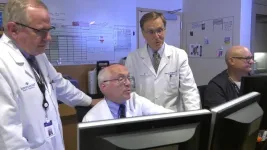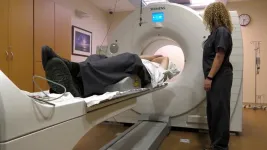(Press-News.org) Many cases of sudden cardiac death could be avoided thanks to artificial intelligence. As part of a new study to be published in European Heart Journal, a network of artificial neurons imitating the human brain was developed by researchers from Inserm, Paris Cité University and the Paris public hospitals group (AP-HP), in collaboration with their colleagues in the USA. During the analysis of data from over 240 000 ambulatory electrocardiograms, this algorithm identified patients at risk of a serious arrhythmia that was capable of triggering cardiac arrest within the following 2 weeks in over 70% of cases.
Each year, sudden cardiac death is responsible for over 5 million deaths worldwide[1]. Many of these cardiac arrests occur out of the blue with no identifiable warning signs, striking individuals from the general population who do not always have a known history of heart disease.
Artificial intelligence could help to improve the anticipation of arrhythmias – unexplained heart rhythm disorders which, if severe, can cause fatal cardiac arrest – according to a new study led by a team of researchers from Inserm, Paris Cité University and the Paris public hospitals group (AP-HP), in collaboration with their colleagues in the USA.
As part of this study, a network of artificial neurons was developed by a team of engineers from the company Cardiologs (Philips group) in collaboration with the universities of Paris Cité and Harvard. What this algorithm does is imitate the functions of the human brain in order to improve the prevention of cardiac sudden death.
The researchers analysed several million hours of heartbeats thanks to data from 240 000 ambulatory electrocardiograms collected in six countries (USA, France, UK, South Africa, India and Czechia).
Thanks to artificial intelligence, the researchers were able to identify new weak signals that herald the risk of arrhythmia. They were particularly interested in the time needed to electrically stimulate and relax the heart ventricles during a complete cycle of cardiac contraction and relaxation.
"By analysing their electrical signal for 24 hours, we realised that we could identify the subjects susceptible of developing a serious heart arrhythmia within the next two weeks. If left untreated, this type of arrhythmia can progress towards a fatal cardiac arrest", explains Dr Laurent Fiorina, first author of the study, researcher at the Paris Cardiovascular Research Centre (PARCC) (Inserm/Paris Cité University), cardiologist at Cardiovascular Institute Paris-Sud (ICPS) (Ramsay, Massy), and medical director in charge of artificial intelligence at Philips.
While the artificial neural network is still in the evaluation phase, it showed itself in this study to be capable of detecting at-risk patients in 70% of cases, and no-risk patients in 99.9% of cases.
In the future, this algorithm could be used to monitor at-risk patients in hospital. If its performances are refined, it could also be used in devices such as ambulatory Holters that measure blood pressure to reveal hypertension risks. It could even be used in smartwatches.
"What we're proposing here is a paradigm change in the prevention of sudden death, comments Eloi Marijon, Inserm research director at PARCC (Inserm/Paris Cité University), professor of cardiology at Paris Cité University and head of the cardiology department at Georges Pompidou European Hospital AP-HP. Until now we'd been trying to identify patients at risk over the medium and long term, but were incapable of predicting what could happen in the minutes, hours or days that precede a cardiac arrest. Now, thanks to artificial intelligence, we can predict these events in the very short term and potentially take action before it's too late."
The researchers now wish to conduct prospective clinical studies to test the efficacy of this model under real-world conditions.
"It's essential for this technology to be evaluated in clinical trials before being used in medical practice, insists Dr Fiorina. But what we've already shown is that AI has the potential to radically transform the prevention of serious arrhythmias."
[1] https://www.thelancet.com/commissions/sudden-cardiac-death
END
Artificial intelligence in the prevention of sudden death
2025-03-30
ELSE PRESS RELEASES FROM THIS DATE:
Oral semaglutide vastly reduces heart attacks, strokes in people with type 2 diabetes
2025-03-29
Both the injectable and oral forms of semaglutide, a glucagon-like peptide-1 receptor agonist, have gained recent attention for their effectiveness against weight gain, high blood sugar, and even alcohol cravings.
A new clinical trial, co-led by endocrinologist and diabetes expert John Buse, MD, PhD, and interventional cardiologist Matthew Cavender, MD, MPH, at the UNC School of Medicine has shown that the oral form of semaglutide can significantly reduce cardiovascular events in people with type 2 diabetes, atherosclerotic cardiovascular disease, and/or ...
Prothrombin complex concentrate vs frozen plasma for coagulopathic bleeding in cardiac surgery
2025-03-29
About The Study: In this unblinded randomized clinical trial, prothrombin complex concentrate had superior hemostatic efficacy and safety advantages to frozen plasma among patients requiring coagulation factor replacement for bleeding during cardiac surgery.
Corresponding Author: To contact the corresponding author, Keyvan Karkouti, MD, email keyvan.karkouti@uhn.ca.
To access the embargoed study: Visit our For The Media website at this link https://media.jamanetwork.com/
(doi:10.1001/jama.2025.3501)
Editor’s Note: Please see the article for additional information, including other authors, author contributions and affiliations, ...
Who needs a statin? New study compares prescribing recommendations based on traditional risk factors vs. coronary artery calcium scoring
2025-03-29
A new study by researchers at Intermountain Health in Salt Lake City aims to determine the best method to screen and evaluate patients who are at risk of developing coronary heart disease and which patients would benefit from taking a statin medication to lower cholesterol.
Currently, cardiologists determine a patient’s need for a statin based on traditional risk factors, using the Pooled Cohort Equation (PCE), which calculates coronary risk by assessing the risk factors of age, sex, total and HDL cholesterol levels, blood pressure, and whether someone ...
Finerenone and atrial fibrillation in heart failure
2025-03-29
About The Study: The efficacy of finerenone was consistent regardless of atrial fibrillation status in this study. New-onset atrial fibrillation was associated with a substantially higher risk of subsequent outcomes.
Corresponding Author: To contact the corresponding author, John J. V. McMurray, MD, email john.mcmurray@glasgow.ac.uk.
To access the embargoed study: Visit our For The Media website at this link https://media.jamanetwork.com/
(doi:10.1001/jamacardio.2025.0848)
Editor’s Note: Please see the article for additional information, including other authors, ...
Low coronary artery calcium score is associated with an excellent prognosis regardless of a person’s age, new study finds
2025-03-29
Having a coronary artery calcium (CAC) score of zero has generally been accepted as a marker of a very low risk of having a cardiac event within the next five years. However, age is a strong contributor to coronary risk, with risk increasing markedly as people age.
Whether age-related risk factors diminish the low risk predicted by a zero coronary artery calcium score has been uncertain – until now.
A large new study of more than 40,000 patients from heart researchers at Intermountain Health in Salt Lake City finds that a zero coronary artery calcium score continues to be an accurate indicator of a low risk for a coronary ...
Groundbreaking consensus statement on conduction system pacing released: a major milestone in the evolution of pacing therapy
2025-03-29
Vienna, 30 March 2025– The European Society of Cardiology (ESC) has released a groundbreaking consensus statement on conduction system pacing (CSP), marking a significant milestone in the evolution of pacing therapy. The document was officially presented today at the EHRA 2025 congress in Vienna and simultaneously published in EP Europace.
For over 50 years, right ventricular pacing has been a standard treatment for slow heart rhythms. However, in some patients, this approach can lead to reduced heart function and even heart failure. Furthermore, biventricular pacing ...
Nuclear monitoring system suggests landslide cut off internet in west Africa
2025-03-29
Hydroacoustic signals captured by the world’s international nuclear monitoring system suggest an underwater landslide may have broken communications cables and disrupted internet traffic in west African countries for several weeks in March 2024.
Researchers used data collected by hydrophones installed by the International Monitoring System of the Comprehensive Nuclear-Test-Ban Treaty Organization (CTBTO) to determine the location of the possible landslide, placing it along the steep slopes of Trou Sans Fond Canyon offshore of Ivory Coast.
The proposed landslide corresponds with the timing and location of four broken cables in the canyon, according to Vaibhav Vijay Ingale of UC ...
PNNL scientist elected AAAS fellow
2025-03-29
RICHLAND, Wash.—Chemist Zheming Wang, whose research largely focuses on the chemistry underlying radioactive and advanced energy materials, as well as critical elements, has been elected as a Fellow of the American Association for the Advancement of Science—the highest honor the society bestows. AAAS is the world's largest multidisciplinary scientific society with a mission to “advance science, engineering, and innovation throughout the world for the benefit of all people.”
AAAS notes that Fellows are celebrated for contributions that span ...
American College of Cardiology recognizes five JACC Rocket Fuel Consultants
2025-03-28
The American College of Cardiology will honor five cardiovascular experts with the JACC Rocket Fuel Consultant Award for fueling JACC’s mission to provide high-quality, pertinent research and improve heart health for all. The awardees will be recognized during ACC’s Annual Scientific Session (ACC.25) in Chicago.
This is the first year of the JACC Rocket Fuel Consultant Award. The JACC consultant program invites experts to provide comprehensive assessments of a submission’s quality, importance and impact. Their contributions streamline the review process and ensure that JACC maintains its commitment to high-quality research.
The 2025 JACC Rocket ...
American College of Cardiology, Association of Black Cardiologists recognize three Merck Research Fellowship awardees
2025-03-28
The American College of Cardiology and the Association of Black Cardiologists have selected three recipients of the Merck Research Fellowship Award, fostering the next generation of cardiovascular investigators. Awardees will be recognized during the American College of Cardiology’s Annual Scientific Session (ACC.25) in Chicago.
The ACC/ABC Merck Research Fellowship provides three, one-year fellowships totaling $100,000 to support one year of cardiovascular research. The year of research began in December 2024 and will run through December 2025.
This year’s recipients and their research titles are:
Temidayo ...



